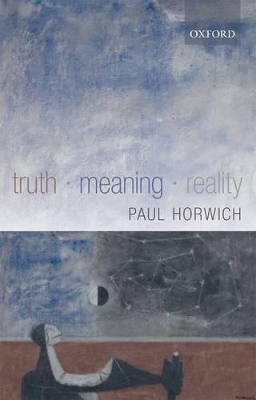
Truth -- Meaning -- Reality
Seiten
2010
Oxford University Press (Verlag)
978-0-19-926891-7 (ISBN)
Oxford University Press (Verlag)
978-0-19-926891-7 (ISBN)
Truth -- Meaning -- Reality presents a broad and unified deflationism that encompasses language, thought, knowledge, and reality. Horwich's story begins with his minimalist view of truth -- paving the way to an account of meaning as use. The fourteen essays constitute a coherent and complete expression of this three-pronged philosophy.
Truth -- Meaning -- Reality presents a fresh approach to philosophy: a broad and unified deflationism that encompasses language, thought, knowledge, reality, and the relations between them.
Horwich's story begins with a minimalist view of truth according to which this extraordinary concept is far less profound and substantial than has usually been assumed, since it stems entirely from our regarding "It is true that dogs bark" as equivalent to "Dogs bark", and similarly in the case of all other statements. There's nothing more to truth than that!
This view turns out to be of fundamental importance throughout the subject. In the first instance it paves the way to an account of meaning as use, whereby the sense of each word-type is given by its basic patterns of deployment rather than by its association with a feature of the non-linguistic world. And the combination of deflated truth and 'meaning as use' then yields a perspective from which the long-standing debates between forms of 'realism' and 'anti-realism' must be reconceived. We are able to see that the positions typically adopted in these debates are all defective -- contrived products of the mistaken assumption that reality, together with our representation of it, must exhibit a rigid uniformity and that deviations from the norm would be intolerably 'weird'.
The fourteen essays collected here constitute a coherent and complete expression of this three-pronged philosophy. Each of them is self-standing. But they have been revised and arranged so as to reveal the power and plausibility of Horwich's overall approach.
Truth -- Meaning -- Reality presents a fresh approach to philosophy: a broad and unified deflationism that encompasses language, thought, knowledge, reality, and the relations between them.
Horwich's story begins with a minimalist view of truth according to which this extraordinary concept is far less profound and substantial than has usually been assumed, since it stems entirely from our regarding "It is true that dogs bark" as equivalent to "Dogs bark", and similarly in the case of all other statements. There's nothing more to truth than that!
This view turns out to be of fundamental importance throughout the subject. In the first instance it paves the way to an account of meaning as use, whereby the sense of each word-type is given by its basic patterns of deployment rather than by its association with a feature of the non-linguistic world. And the combination of deflated truth and 'meaning as use' then yields a perspective from which the long-standing debates between forms of 'realism' and 'anti-realism' must be reconceived. We are able to see that the positions typically adopted in these debates are all defective -- contrived products of the mistaken assumption that reality, together with our representation of it, must exhibit a rigid uniformity and that deviations from the norm would be intolerably 'weird'.
The fourteen essays collected here constitute a coherent and complete expression of this three-pronged philosophy. Each of them is self-standing. But they have been revised and arranged so as to reveal the power and plausibility of Horwich's overall approach.
Paul Horwich (BA Oxford 1968, MA Yale 1969, PhD Cornell 1974) is a Professor of Philosophy at New York University.
Preface ; 1. What is truth? ; 2. Varieties of deflationism ; 3. A defense of minimalism ; 4. The value of truth ; 5. A minimalist critique of Tarski ; 6. Kripke's paradox of meaning ; 7. Regularities, rules, meanings, truth conditions, and epistemic norms ; 8. Semantics: What's truth got to do with it? ; 9. The motive power of evaluative concepts ; 10. Ungrounded reason ; 11. The nature of paradox ; 12. A world without 'isms' ; 13. The quest for REALITY ; 14. Being and truth ; Provenance of essays ; Bibliography ; Index
| Erscheint lt. Verlag | 7.1.2010 |
|---|---|
| Verlagsort | Oxford |
| Sprache | englisch |
| Maße | 138 x 215 mm |
| Gewicht | 453 g |
| Themenwelt | Geisteswissenschaften ► Philosophie ► Erkenntnistheorie / Wissenschaftstheorie |
| Geisteswissenschaften ► Philosophie ► Metaphysik / Ontologie | |
| Geisteswissenschaften ► Philosophie ► Sprachphilosophie | |
| ISBN-10 | 0-19-926891-6 / 0199268916 |
| ISBN-13 | 978-0-19-926891-7 / 9780199268917 |
| Zustand | Neuware |
| Haben Sie eine Frage zum Produkt? |
Mehr entdecken
aus dem Bereich
aus dem Bereich
die Grundlegung der modernen Philosophie
Buch | Softcover (2023)
C.H.Beck (Verlag)
18,00 €
Buch | Softcover (2023)
Reclam, Philipp (Verlag)
7,00 €

![Was heißt Denken?. Vorlesung Wintersemester 1951/52. [Was bedeutet das alles?] - Martin Heidegger](/media/113619842)
